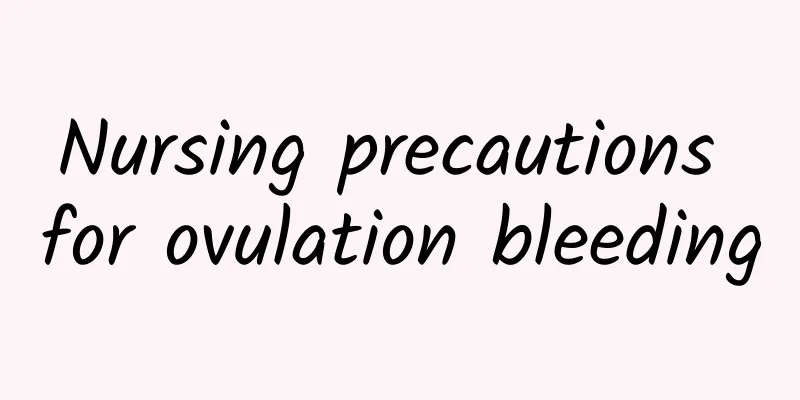Nursing precautions for ovulation bleeding

|
The ovulation period is the time when women are most likely to get pregnant. Ovulation bleeding is a common symptom. So what should we do about ovulation bleeding? How to prevent ovulation bleeding? Gynecological disease experts said that during a woman's non-menstrual ovulation cycle, due to a temporary decrease in estrogen levels, the follicle ruptures, causing the endometrium to be unable to continue to grow, thus causing symptoms of endometrial shedding and bleeding. Similar to menstruation, women may feel a pain in the lower abdomen when bleeding during ovulation. This is caused by the shedding of serous membranes and a small amount of blood accumulation in the pelvic cavity. However, it generally does not last for a long time, at most two or three days, and at least a few hours. Precautions for ovulation bleeding: 1. Pay attention to hygiene and prevent infection. Pay attention to the hygiene of the external genitalia. Do not have sexual intercourse during menstruation. Keep warm and avoid cold stimulation. Avoid overwork. People with heavy menstrual bleeding should avoid eating brown sugar. 2. Keep a happy spirit, avoid mental stimulation and mood swings. Some people may experience lower abdominal distension, backache, breast pain, mild diarrhea, fatigue, drowsiness, emotional instability, irritability or depression during menstruation. These are all normal and there is no need to be overly nervous. 3. Underwear should be soft, made of cotton, with good ventilation and air permeability. It should be washed and changed frequently, and the changed underwear should be dried in the sun. 4. Avoid eating raw, cold, sour, spicy and other irritating foods, drink more water, and keep bowel movements smooth. People with hot blood should eat more fresh fruits and vegetables before menstruation, and avoid eating onions, garlic, leeks, ginger and other things that stimulate fire. 5. People with qi and blood deficiency during the ovulation period must increase their nutrition, such as milk, eggs, soy milk, pork liver, spinach, pork, chicken, mutton, etc., and avoid eating raw and cold fruits and vegetables. Experts remind that occasional ovulation bleeding is not harmful to the body. Most of the time, it is caused by overwork or low immunity, which affects the endocrine balance. It can be treated without treatment. If ovulation bleeding occurs frequently, it should be considered to be caused by endocrine disorders. Under the guidance of a doctor, some estrogen supplements can be used. Once the amount of bleeding is too much or even exceeds the normal menstrual volume, you need to go to the hospital for a comprehensive examination to rule out the presence of other organic diseases. |
<<: Can I get pregnant if I have ovulation bleeding?
>>: When can I have an abortion for candidal vaginitis?
Recommend
Three effective methods for treating cervical hypertrophy
With the continuous development of medical techno...
Can microwave treatment really eradicate cervical erosion?
Can microwave treatment really eradicate cervical...
What are the causes of recurrent miscarriage? There are 6 major reasons
There are many reasons for recurrent miscarriage,...
When will cervical hypertrophy recover?
Cervical hypertrophy needs to be improved through...
How can women of childbearing age reduce abortion?
Women can conceive for more than 20 years in thei...
Several common measures to prevent cervical erosion
There are many cervical diseases in life, and cer...
Can triamcinolone acetonide econazole cream be used for vulvar itching?
Can triamcinolone acetonide econazole cream be us...
Why does cervical erosion recur?
If women suffer from chronic cervicitis and do no...
Special attention should be paid to the postoperative care of ectopic pregnancy
Unlike normal pregnancy, ectopic pregnancy is a v...
Chinese medicine Codonopsis pilosula replenishes vitality and is cultivated locally, so there is no need to worry about unscrupulous goods
The Council of Agriculture's Hualien District...
What are the specific symptoms of pelvic peritonitis
In life, we need to pay attention to the occurren...
What will happen if an ovarian cyst is serious? How to prevent ovarian cysts
What happens if ovarian cysts are severe? How to ...
What are the early symptoms of ectopic pregnancy in women?
Ectopic pregnancy refers to a manifestation of ec...
How to effectively treat endometrial tuberculosis?
There are many causes of endometrial tuberculosis...
Pelvic inflammatory disease may cause lower back pain due to inflammation
Pelvic inflammatory disease may cause back pain d...









